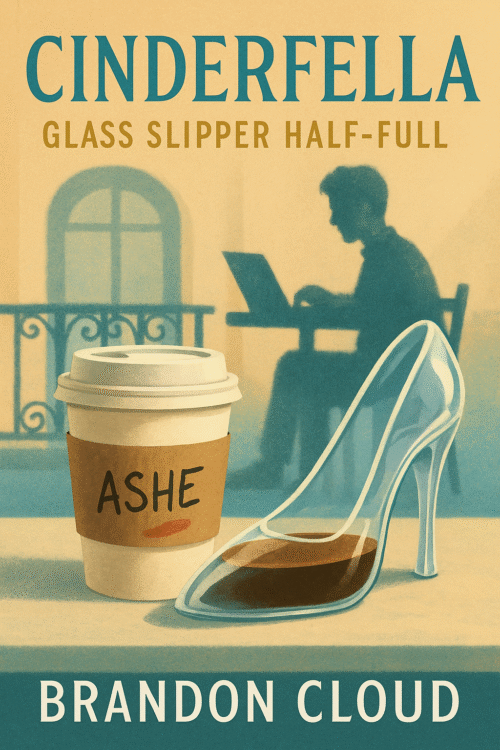Read Cinderfella: Glass Slipper Half-Full • Visit my Amazon author page

If you’ve ever tried to hold your life together with bus transfers, group chats, and a borrowed suit that smells like ambition—hi. That’s where Cinderfella lives. It’s a Cinderella retelling for the rent-burdened, burnout-bruised, boundary-building crowd: magic that shows up late, refuses to do dishes, and still changes something true.
I wrote Cinderfella because I got tired of stories where rescue is the prize and survival is an aesthetic. I wanted a fairytale that admits to invoices, side hustles, and the way desire gets misfiled as need. The book says the quiet part first: “This is not a story about rescue.”
What it’s about, in plain clothes: Asher writes a viral essay and pays the tax for telling the truth—doxxing, pile-on, a landlord who cosplays as an auntie with a clipboard. A DM arrives like a cracked door: one night in New York, the kind of Ball that feeds on performance and spits out selfies. There’s a fairy godparent who prefers scaffolding over saviorism, a prince who’s just a man with good grammar and boundaries, and a lost item that refuses to be delicate. Through it all, the thesis doesn’t blink: “Recognition, not rescue.”
Why re-imagine Cinderella at all?

Because the old versions confuse silence with virtue and obedience with love. Because queerness teaches different math: we recognize each other before we “win” each other; we build family out of witnesses, not witnesses out of fans. Cinderfella keeps the crown—there’s a Ball, a fairy, a slipper—but drags it through the real world until it means something: “The magic isn’t in the slipper. It’s in the decision to keep walking barefoot when no one hands you one.”
And yes, there’s a slipper—but it’s a Doc Marten left grinning on a street grate while Asher walks home with one bare foot and one boot, learning that wholeness is sometimes an improvisation you choose, not a costume you borrow. The book refuses the old choreography: you don’t get saved for being good; you get seen for being real. Sometimes that’s louder than love. Sometimes that is love.
Who you’ll meet (and why they matter)
- Asher (our queer Cinderella) is allergic to tidy arcs and well-behaved trauma. He hosts trivia, runs receipts, counts bottle caps like prayers, and keeps choosing dignity over applause. He’s the boy who learns how to want without disappearing.
- Fay (our Fairy Godparent) does contracts, strategy, and tenant-law introductions. He believes in work that looks like magic because the work is precise: we’re scaffolding, not saviors.
- Ellis (our maybe-Prince) is recognition, not rescue. He opens doors but refuses to carry anyone through them. Their chemistry is built like a bridge: measured, load-bearing, never ornamental.
- Stace and Gus (our stepsibs remix) are messy, funny, infuriating—love you badly then better. The arc isn’t humiliation; it’s competence. Skill replaces clout. A brush roll replaces a brand deal. The house smells like citrus by the end of their chapter—not redemption, just work that worked.
- Marla (our landlord) is the myth of benevolence with a ring light. She’s the reason paperwork becomes liturgy, and why Asher learns the difference between procedure and performance.
The romance (the unglamorous, earned kind)
I love a slow burn that refuses pyrotechnics. The gravity between Asher and Ellis lives in small, behavioral specifics: a sleeve-tug that reads as choreography, not claim; water handed without a speech; a greenroom door held open long enough for agency to walk through first. Love isn’t rescue here—it’s recognition said in a language that doesn’t need a microphone. It’s a yes that costs something, and a no that protects the yes.
How Cinderfella talks back to the original
Cinderella taught us transformation is spectacle: get hot, get chosen, get gone. Cinderfella argues the inverse: transform privately and show up sturdier. In this book, the “slipper test” isn’t a sweepstakes; it’s a boundary. Will you let attention rename you? Will you trade your mouth for a platform? Or will you leave the boot where myth demands a prop and walk out with your name still attached to your body? The answer isn’t heroic. It’s human: “Sometimes the slipper breaks because you’ve outgrown it.”
Why I wrote it (and why now)
I write because I don’t trust pretty stories that skip the invoice. Queer survival is admin—forms, screenshots, group texts, the dull holiness of keeping records. After years in hospitality and healthcare, I wanted a fairytale that smells like fryer oil and lemon concentrate, where a filing at the clerk’s office can be braver than a kiss at midnight. I wanted a book where friendship fails and then learns a new job, where romance is not a ladder out but a mirror that doesn’t flinch.
And I wanted to say, aloud, the thing so many of us learned the hard way: “We don’t promise happy endings here. But we do promise you’re not alone.”
Five moments to taste the voice
“This is not a story about rescue.”
“The magic isn’t in the slipper. It’s in the decision to keep walking barefoot when no one hands you one.”
“Sometimes the slipper breaks because you’ve outgrown it.”
“Recognition, not rescue.”
“We don’t promise happy endings here. But we do promise you’re not alone.”
Why it matters to reimagine fairytales through a realistic queer lens
Because fairy tales aren’t real—but magic still is. Not the wand-wave kind. The kind that happens when someone says your name like it belongs to you, when a friend shows up without turning it into content, when you file a complaint and choose procedure over performance. Cinderfella insists on a magic that invoices. It costs time, pride, and sometimes a pair of boots. It pays out in spine.
Read it (and how to support)
Cinderfella: Glass Slipper Half-Full is free to read with Kindle Unlimited, and all my books launch free for the first five days and remain free with KU afterward. Kindle Unlimited also offers a 3-month free trial, so if you’re KU-curious, this is your sign. Then, if the book leaves a mark—laugh, bruise, recognition—please leave a review. It matters more than algorithms admit.
Thank you for reading indie, for believing that romance can be jagged and still worth it, and for choosing stories where the slipper doesn’t make the person—the person decides whether to wear the thing at all. If you’re ready for a fairytale that knows what rent costs and still lets you keep your name, step in: Cinderfella.